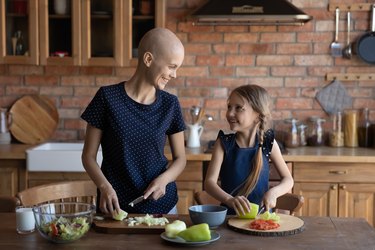
When you're battling advanced cancer, you likely have enough on your plate. But you also need to look at what's on your breakfast, lunch and dinner plates. If you're on chemo and radiation, the right cancer diet plan can make a big difference in how you feel.
Read more: The Best Foods to Eat if You Have Cancer
Video of the Day
Video of the Day
Why Have a Cancer Diet Plan?
In order to stay strong and have your best shot at fighting cancer, you need your strength, which comes from nutrients.
"Cancer treatment — whether surgery, radiation and/or chemotherapy — can have a big impact on your nutrient needs, your eating habits and how your body absorbs and uses food," says Ginger Hultin, RDN, CSO, Seattle-based registered dietitian nutritionist and spokesperson for the Academy of Nutrition and Dietetics.
Hultin, who specializes in oncology nutrition, says your goal in choosing and preparing the food you eat should be to minimize nutrition-related side effects and maximize quality of life. (It helps to work with a registered dietitian, preferably one who is a certified oncology specialist, she says.) A personalized cancer diet plan enables you "to stabilize your body weight and even minimize side effects from treatment, such as nausea and vomiting," she adds.
Pre-Treatment To-Dos
Hultin suggests several tips you can implement ahead of treatment. To help ensure that you are stocked and ready:
- Fill your pantry and freezer with your favorite foods so you won't need to shop as often. "Keeping healthy canned and frozen options ready can be helpful. Think: soups, stews, casseroles, but also trail mix, energy bars and balls, and smoothie ingredients," Hultin says.
- Include foods you know you will be able to eat when you're not feeling well. Your interest in spices and tastes may change if you develop mouth sores or other side effects, Hultin notes.
- Cook and freeze foods in what you think are good meal-sized portions.
Hultin also suggests that you arrange for help. "Ask friends and family to help you, but be specific about what you want them to do, such as shop, cook or prepare foods you won't have trouble eating," she says. "Also, you want to make sure to give specific guidance on food safety if you're immune-compromised."
During-Treatment To-Dos
When undergoing treatment, it's not unusual to lose interest in food and have little or no appetite, according to the American Cancer Society. To combat that appetite loss, Hultin and the ACS suggest the following:
- Go small. Nibble here and there on high-protein snacks rather than trying to stuff a big meal into your mouth. Eating throughout the day will also help keep your energy levels up, according to the University of Pennsylvania (UPenn).
- Go for your favorites. Do you like pancakes more than chicken? It's OK to have breakfast for dinner. Eat whatever you like best whenever that is.
- Make it fun. Invite someone to eat with you. Put some flowers or family photos (whatever makes you smile) on the table in front of you. If you fancy, watch TV while you eat, or do anything to make mealtime more fun.
- Save the drinks. It's important to stay hydrated, but you don't want liquids to fill you up. If you need to drink because your mouth is dry, take small sips. Try to get your hydration between meals, rather than with meals.
Post-Treatment To-Dos
While you want to eat as healthy as you can, go easy on yourself, Hultin says. Don't worry too much about occasionally indulging in a less-healthy comfort food if it brings you pleasure, she says.
Per UPenn, choose foods that are high in protein and fat to provide energy and calories. Good choices include:
- High-fat dairy products.
- Oral nutrition supplements.
- Crackers with cheese.
- Nut butters.
And when it's tough to swallow, UPenn recommends plain, soft, moist foods such as:
- Cream-based soups.
- Yogurts.
- Puddings.
- Hot cereals.
- Mac and cheese.
- Ground meats.
- Mashed potatoes with gravy.
The most important thing for you is to work with a specialist to individualize your diet toward what you need and the foods you enjoy, Hultin says. "That being said, national guidelines suggest eating less red and processed meat, added sugar (in beverages, too) and eliminating alcohol."
Is this an emergency? If you are experiencing serious medical symptoms, please see the National Library of Medicine’s list of signs you need emergency medical attention or call 911.